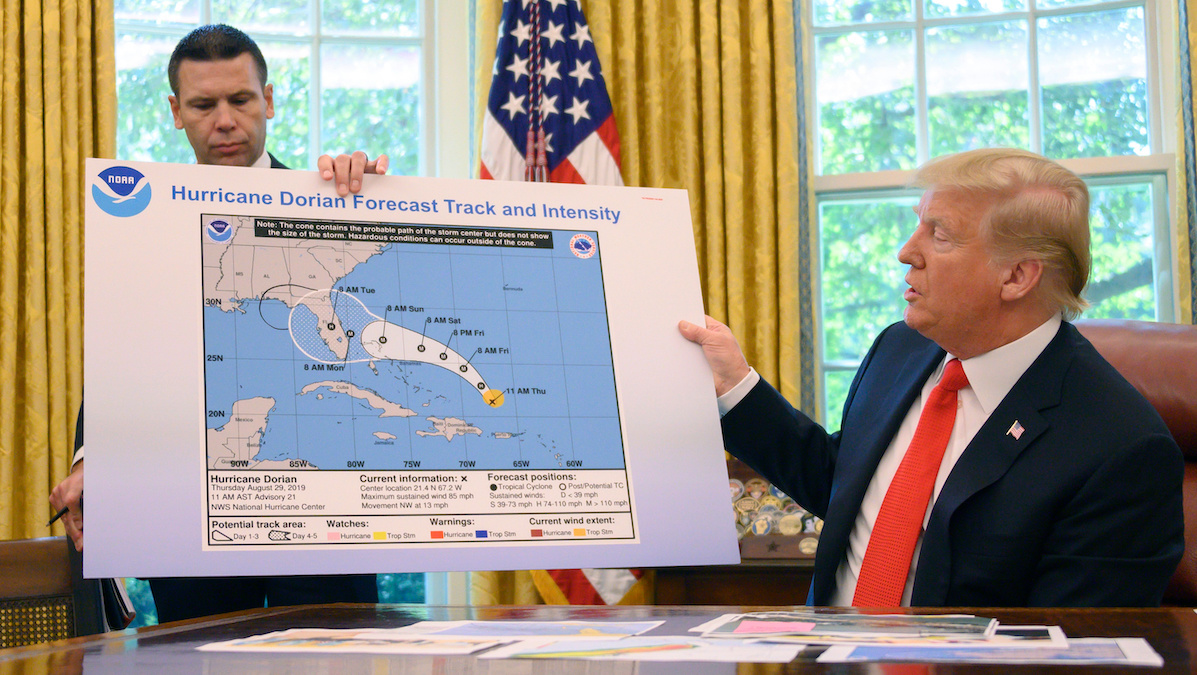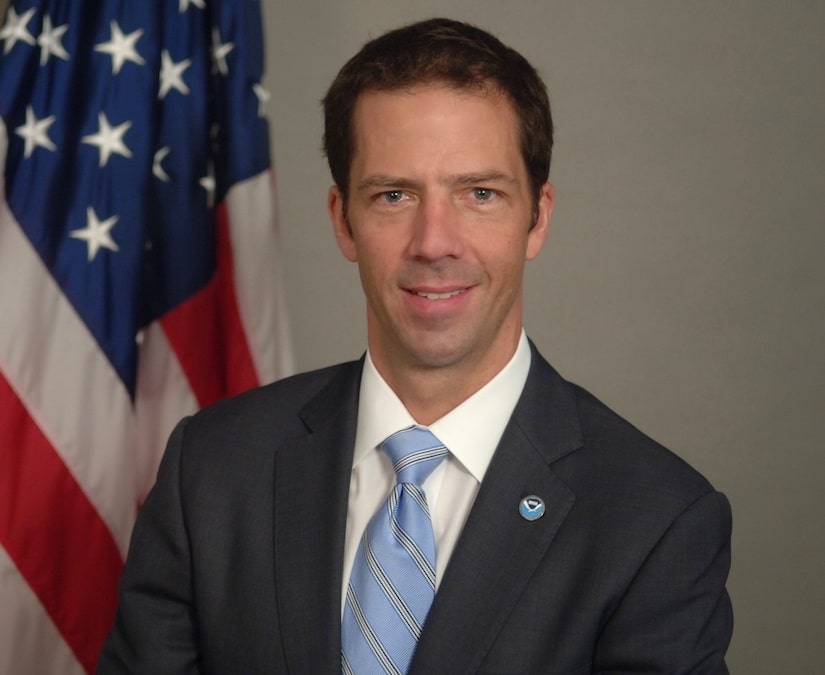
NOAA Chief Violated Ethics and Scientific Integrity in ‘Sharpiegate’ Scandal

Donald Trump talks to reporters following a briefing from officials about Hurricane Dorian in the Oval Office at the White House Sep. 4, 2019 in Washington, DC. The map was a forecast from Aug. 29 and appears altered by a black marker to extend the hurricane's range to include Alabama. Chip Somodevilla / Getty Images
The string of people who have compromised their professional ethics to cow to President Trump‘s falsehoods now officially includes the head of the National Oceanic and Atmospheric Administration, or NOAA, who was found to have violated its ethics and its scientific integrity policy when he contradicted and silenced a local National Weather Service office about Hurricane Dorian’s path last fall, an independent investigation has found, according to The New York Times.
As a reminder of what happened last September, Hurricane Dorian was churning through the Caribbean, heading for Florida. Before it made landfall, Trump tweeted that Alabama would get hit “harder than anticipated.”
Knowing how jarring disaster preparation and evacuations can be, the NOAA’s Birmingham office issued a tweet stressing that the state “will NOT see any impacts from Dorian.” That led to an unsigned letter from NOAA saying that there was actually a 20 percent chance the hurricane would strike Alabama.
Soon after that, internal NOAA emails showed concern from top officials that politics was interfering in scientific matters, which the agency’s acting chief scientist called a danger to public health and safety, as Axios reported.
The controversy came to be known as “Sharpiegate,” after Trump showed an altered map that included Alabama’s southeast corner in the storm’s path.
That led to the current independent investigation. The panel of experts found that Neil Jacobs, NOAA’s acting administrator, and former NOAA deputy chief of staff and communications director Julie Kay Roberts, “engaged in the misconduct intentionally, knowingly, or in reckless disregard of the Code of Scientific Conduct or Code of Ethics for Science Supervision and Management in NOAA’s Scientific Integrity Policy,” as CNN reported.

Official portrait of NOAA acting administrator Neil Jacobs. NOAA
It turned out that the unsigned letter that contradicted NOAA scientists was a clear example of political loyalty interfering with scientific misinformation. Commerce Secretary Wilbur Ross, who oversees NOAA, threatened to fire the political staff at the agency unless the contradiction of Mr. Trump was addressed.
The independent panel said that Jacobs and Roberts twice violated codes of the agency’s scientific integrity policy amid their involvement in the Sept. 6 statement, according to The Washington Post.
“It will be clear to anyone reviewing the accounts captured in this highly credible, independent Scientific Integrity report that the political leaders who interfered in our emergency response system need to publicly apologize or resign,” said Rep. Paul Tonko, a New York Democrat who made an integrity complaint and is the sponsor of a bill that would increase accountability for such violations across federal science agencies, as The Washington Post reported.
The report that was released yesterday was led by Stephen M. Volz, an assistant administrator at NOAA. He called for the agency to guarantee “the right of NOAA scientists to review, comment, and amend any official communication that relies on their scientific analysis,” as The New York Times reported.
The report also called for clear delineation between NOAA’s scientific arm and the Department of Commerce, “acknowledging the responsibility for NOAA to own the scientific content and allowing for Commerce to weigh in on policy content.”
It’s worth noting that the report, which is from the National Academy of Public Administration, had limits on its scope. It was not allowed to interview the Commerce Department officials who demanded the unsigned statement be released, as The Washington Post reported.
That omission bothered Michael Halpern, deputy director of the Center for Science and Democracy at the Union of Concerned Scientists, who told The New York Times the report stopped short of providing accountability. “In the immediate term, there are no consequences for the senior leaders who betrayed their scientific staff,” Mr. Halpern said.
- NOAA Officials Backed Trump's False Dorian Claims Under Threat ...
- Trump Admin Manipulated Wildfire Science to Encourage Logging ...
- 'Science Under Siege' From Trump Admin: New Report Warns We ...
- Want More Science-Based Policies? Protect Scientists

 233k
233k  41k
41k  Subscribe
Subscribe 